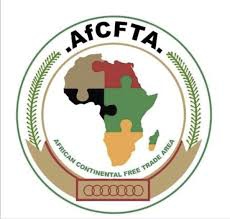
AfCFTA
The African Continental Free Trade Area (AfCFTA) is a flagship project of the African Union’s Agenda 2063, a blueprint for attaining inclusive and sustainable development across the continent over the next 50 years. It aims to boost intra-African trade by providing a comprehensive and mutually beneficial trade agreement among the member states, covering trade in goods and services, investment, intellectual property rights and competition policy.
The Agreement entered into force on 30 May, 2019 for the 24 countries that had deposited their instruments of ratification with the African Union Commission (AUC) Chairperson – the designated depositary for this purpose. This date marked 30 days after the 22-country threshold had been reached on 29 April, 2019, as stipulated in Article 23 of the Agreement.
The operational phase of the AfCFTA was subsequently launched during the 12th Extraordinary Session of the Assembly of the African Union in Niamey, Niger on 7 July 2019. The AfCFTA will be governed by five operational instruments, i.e. the Rules of Origin; the online negotiating forum; the monitoring and elimination of non-tariff barriers; a digital payments system and the African Trade Observatory.
The AfCFTA Secretariat – charged with various responsibilities related to the implementation of the AfCFTA – is hosted by Ghana. H.E. Mr. Wamkele Mene was elected the first Secretary General of the Secretariat on 19 March 2020. The AfCFTA Secretariat was officially handed over in Accra, Ghana on 17 August 2020.
An Extraordinary Summit of the AU Assembly on the AfCFTA took place virtually on 5 December 2020. The Assembly approved the start of trading under the AfCFTA Agreement as 1 January 2021. To date, 34 countries have both signed and deposited their instruments of AfCFTA ratification with the AUC Chairperson. Of the 55 AU member states, only Eritrea has yet to join.
Background
The 18th Ordinary Session of the Assembly of Heads of State and Government of the African Union, held in Addis Ababa, Ethiopia in January 2012, adopted a decision to establish a Continental Free Trade Area by an indicative date of 2017. This deadline was, however, not met. The Summit also endorsed the Action Plan on Boosting Intra-Africa Trade (BIAT) which identifies seven priority action clusters: trade policy, trade facilitation, productive capacity, trade related infrastructure, trade finance, trade information, and factor market integration. The Agreement establishing the AfCFTA was signed in March 2018, in Kigali Rwanda, following conclusion of the main legal texts. The main objectives of the AfCFTA are to create a single market for goods and services, facilitate the movement of persons, promote industrial development and sustainable and inclusive socio-economic growth, and resolve the issue of multiple memberships, in accordance with Agenda 2063. It lays a foundation for the establishment, in future, of a Continental Common Market.
The AfCFTA will bring together all 55 member states of the African Union covering a market of more than 1.2 billion people, including a growing middle class, and a combined gross domestic product (GDP) of more than US$3.4 trillion. In terms of numbers of participating countries, the AfCFTA will be the world’s largest free trade area since the formation of the World Trade Organization (only Eritrea is not a party to the Agreement). Estimates from the Economic Commission for Africa (UNECA) suggest that the AfCFTA has the potential both to boost intra-African trade by 52.3 percent by eliminating import duties, and to double this trade if non-tariff barriers are also reduced.
AfCFTA Timeline in brief
The Agreement establishing the AfCFTA (the ‘Agreement’) was signed in March, 2018 in Kigali, Rwanda following conclusion of the main Phase I legal texts: the Agreement along with the Protocol on Trade in Goods, Protocol on Trade in Services, and Protocol on Rules and Procedures on the Settlement of Disputes. Some key area (e.g. rules of origin, tariff offers, and services schedules) still need to be concluded. There have been indications that new negotiations specifically on e-commerce could be included in Phase I. Phase II negotiations on competition, intellectual property rights, and investment continue.
As per the Agreement, the institutional framework for the implementation, administration, facilitation, monitoring and evaluation of the AfCFTA shall consist of the following: (a) the Assembly; (b) the Council of Ministers; (c) the Committee of Senior Trade Officials; and (d) the Secretariat.
The operational phase of the AfCFTA was launched during the 12th Extraordinary Session of the Assembly on the AfCFTA in Niamey, Niger in July, 2019. The AfCFTA will be governed by five operational instruments, i.e. the Rules of Origin; the online negotiating forum; the monitoring and elimination of non-tariff barriers; a digital payments system and the African Trade Observatory.
On 7 July, 2019, it was decided that the Republic of Ghana shall host the AfCFTA Secretariat. It is envisaged that the Secretariat will provide administrative support for the implementation of the AfCFTA Agreement, such as convening meetings, monitoring and evaluating the implementation process and other duties assigned to it by the Committee of Senior Officials, Council of Ministers, and the AU Assembly.
The first meeting of the AfCFTA Council of Ministers responsible for trade took place in Addis Ababa, Ethiopia on 24-25 October, 2019. It was preceded by a meeting of senior technical officials on 21-23 October.
The 33rd Ordinary African Union Assembly, held from 9-10 February, 2020 launched the operational phase of the AfCFTA supported by: i) the agreed AfCFTA Rules of Origin; ii) Dashboard of the AU Trade Observatory; iii) AfCFTA Trade in Goods Password Protected Dashboard; iv) Pan-African Payments and Settlements System; and v) Continental Online Mechanism for Monitoring, Reporting and Elimination of Non-Tariff Barriers.
During Preparatory Meetings for Commencement of Trading under the AfCFTA held from 16-20 November, 2020, AU Head of State and Government urged Member States to prepare national strategies for utilizing and benefiting from the AfCFTA. They also discussed the operationalization of the customs provisions in the Agreement establishing the AfCFTA; the Protocol on Trade in Goods and related annexes as well as the instruments that have been agreed so far
A virtual meeting of the 13th Extra Ordinary Session of the Assembly of the Union on the AfCFTA, held on Saturday, 5 December, 2020, under the Chairmanship of H.E. Mr Cyril Ramaphosa, President of the Republic of South Africa and Chairperson of the African Union (AU), underscored the urgent need for member states to kick-start trading activities under the African Continental Free Trade Area (AfCFTA) which will commence on the 1st of January 2021.
Ratification status
According to Article 23 of the African Continental Free Trade Area Agreement, entry into force occurs 30 days after the 22nd instrument of ratification is deposited with the Chairperson of the African Union Commission (AUC) – the designated depositary for this purpose – an essential step for the AfCFTA to enter into force.
The Agreement entered into force on 30 May 2019 for the 24 countries that had deposited their instruments of ratification before this date.
As at 5 December 2020, 34 countries have deposited their instruments of AfCFTA ratification with the AUC Chairperson. There have also been indications that Somalia, Algeria and Zambia have received Cabinet approval for ratification; official confirmation is pending
